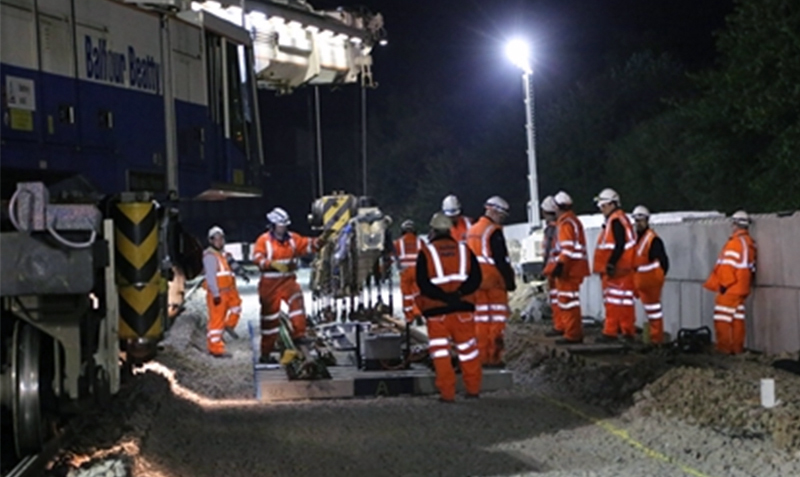Keeping people safe is a key factor at Elite Precast, both within our premises and on-site, so when an opportunity arises to utilise our standard product range to keep rail maintenance workers safe, we were straight on it, says Owen Bathan, Sales and Marketing Director.
In doing so, our interlocking walling system have become an essential component in enhancing safety and efficiency within the rail sector as the innovative Legato® and Duo™ concrete blocks offer several key benefits for railway infrastructure projects:
Safety – Adjacent Line Open (ALO) Operations
The Legato® interlocking block system has been successfully implemented to create solid barriers between open rail lines and those under maintenance. This allows work to be safely conducted adjacent to live lines, reducing the need for all-line possessions and minimising disruptions. The system is particularly valuable for Adjacent Line Open (ALO) or All Line Open operations, which is crucial for reducing disruptive access on busy areas of the rail network.
Worker Protection
This barrier provides a physical protection for track workers, addressing safety concerns highlighted by incidents like the Surbiton station accident in 2021 and has led to improved safety measures during maintenance operations.
Durability and Flexibility
Elite’s interlocking blocks are made from high-strength concrete and feature integral lifting options, making them ideal for creating robust barriers. With a long design life, there blocks offer long-term durability without the expense and disruption associated with in-situ concrete.
Rapid Deployment
The interlocking design allows for quick assembly and disassembly, providing a flexible solution for various railway projects. This was demonstrated in a Network Rail project where the blocks were used to create a “real virtual wall” along a half mile stretch of track, saving a 72-hour all-line possession and reducing customer disruption.
Versatility
Elite’s interlocking blocks have multiple applications within the rail sector, including:
- Creating refuges
- Building retaining wall
- Constructing fire breaks
- Forming blast and push walls
- Providing security and traffic management solutions
Choice
With the Legato® and Duo™ interlocking blocks available within days from Elite’s manufacturing works in Shropshire, the choice of block depends upon the project.
Each block features a cast-in lifting pin for easy loading and installation without the need for expensive specialist lifting equipment, reducing site costs and extended waiting times.
Sustainability
The Elite Legato® and Duo™ blocks are made from 100% natural materials, sourced from local quarries and are 100% recyclable at their end of life. This combined with their long life is sure to help with your sustainability goals.
Service
By keeping large stocks, Elite Precast is able to offer fast deliveries on different vehicles, including artic and rigid vehicles with or without crane offload facilities.
Fire Resistance
The interlocking blocks are Class A1 Fire Resistant, so can be used as part of your FPP (Fire Prevention Plan) and are recommended for use by many insurance companies as fire breaks.
Industry Approval
Elite Precast Concrete’s products have received RISQS (Railway Industry Supplier Qualification Scheme) approval, ensuring they meet the highest industry standards for safety and reliability in rail infrastructure projects.
It’s not just Elite’s interlocking blocks that are proving solutions to the needs of the UK rail operators, as their heavy-duty Jersey Barriers protect against unauthorised access, vehicle incursions and other threats. The are also used for traffic management, flood defence and edge protection within the rail infrastructure.
The Jersey-Lite™ barrier is a smaller, more agile barrier that is lighter and includes a channel to house lighting cable that allow you to illuminate any signage, making it ideal for train stations where you want to stop access to commuters.
By utilising Elite’s interlocking walling and barrier systems, rail operators can significantly improve worker safety, reduce project timelines and minimise disruptions to rail services while maintaining the flexibility to adapt to various project requirements.









